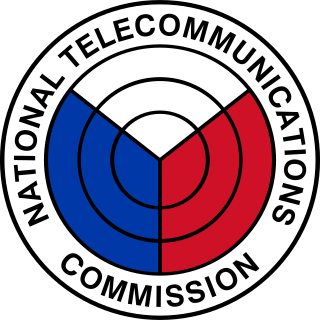Telecommunications in the Philippines are well-developed due to the presence of modern infrastructure facilities. The industry was deregulated in 1995 when President Fidel Ramos signed Republic Act 7925. This law opened the sector to more private players and improved the provision of telecom services are better and fairer rates, leading to the creation of many telecommunication service providers for mobile, fixed-line, Internet and other services.

Globe Telecom, Inc., commonly shortened as Globe, is a major provider of telecommunications services in the Philippines. The company operates the largest mobile network in the Philippines and one of the largest fixed-line and broadband networks. As of March 2022, Globe's total mobile subscriber base reached 87.4 million. It is also the country's largest telecommunications company in terms of market capitalization.

The Department of Budget and Management is an executive body under the Office of the President of the Philippines. It is responsible for the sound and efficient use of government resources for national development and also as an instrument for the meeting of national socio-economic and political development goals.

The Department of Transportation is the executive department of the Philippine government responsible for the maintenance and expansion of viable, efficient, and dependable transportation systems as effective instruments for national recovery and economic progress. It is responsible for the country's land, air, and sea communications infrastructure.

The Philippine Postal Corporation, abbreviated as PhilPost and also known as the Philippine Post Office, is a government-owned and controlled corporation responsible for providing postal services in the Philippines. The Philippine Postal Corporation has in excess of 8,000 employees and runs more than 1,355 post offices nationwide. The Philippine Post Office is based in the Philippines' primary post office, and is currently headed by Postmaster General and CEO Mr. Norman "Postman" N. Fulgencio. The historic Manila Central Post Office is situated at the Plaza Liwasang Bonifacio and overlooks the Pasig River. Its policy-making body is the board of directors, headed by its chairman, Mr. Raul R. Bendigo. The board of directors is composed of seven members, including the postmaster general, who serves simultaneously as the chief executive officer.

The National Telecommunications Commission is an attached agency of the Department of Information and Communications Technology responsible for the supervision, adjudication and control over all telecommunications services and television and radio networks throughout the Philippines.
The Philippine National Broadband Network controversy involved allegations of corruption in the awarding of a US$329 million construction contract to Chinese telecommunications firm ZTE for the proposed government-managed National Broadband Network (NBN).
Joseph Emilio "Jun" Aguinaldo Abaya is a Filipino politician, lawyer, and military officer. He was the Secretary of the Department of Transportation and Communications (DOTC) of the Philippines under the administration of President Benigno Aquino III. A member of the Liberal Party, he has been elected to three terms as a member of the Philippine House of Representatives, representing the 1st District of Cavite. He first won election to the House in 2004, and was re-elected in 2007. He and other Aquino administration officials have been charged over the alleged anomalous contracts for the MRT Line 3 during their tenure.

Digital Telecommunications Phils., Inc., commonly known as Digitel, was the second-largest fixed-line and the third-largest mobile telecommunications company in the Philippines. It was also the company that owned Sun Cellular, a mobile phone service.
The Philippine Cyberservices Corridor is a plan that is being pursued by the government of the Philippines to create interconnected centers of technology-related services, that are spread out all over the country. Services include business process outsourcing, medical transcription, outsourcing of animation, and the like. It is part of the ten-point agenda of President Gloria Macapagal Arroyo and is one of the five "super-regions" outlined in her 2006 State of the Nation Address.

The Office of the President of the Philippines, is an administrative, advisory, consultative government agency which aids the president of the Philippines in performing their duty as head of state and chief of the executive branch of government.

The Department of Information and Communications Technology (DICT) is the executive department of the Philippine government responsible for the planning, development and promotion of the country's information and communications technology (ICT) agenda in support of national development.

Rodolfo "Rudy" Agapay Salalima is a Filipino lawyer who was the first secretary of the Philippine Department of Information and Communications Technology (DICT) under the Duterte administration. Salalima is the former chief legal counsel and senior advisor of Globe Telecom, one of the leading telecommunications firms in the country and has also served as Senior Vice President for Corporate and Regulatory Affairs and Managing Director of Ayala Corporation. He is also the former president of the Philippine Chamber of Telecommunications Operators (PCTO) and International Telecommunication Union Council working group for the amendment of ITU constitution and convention vice chairman for Asia Pacific Region.
The National Privacy Commission, or NPC, is an independent body created under Republic Act No. 10173 or the Data Privacy Act of 2012, mandated to administer and implement the provisions of the Act, and to monitor and ensure compliance of the country with international standards set for data protection. It is attached to the Philippines' Department of Information and Communications Technology (DICT) for purposes of policy coordination, but remains independent in the performance of its functions. The Commission safeguards the fundamental human right of every individual to privacy, particularly Information privacy while ensuring the free flow of information for innovation, growth, and national development.
Philippine Communications Satellite Corporation (PHILCOMSAT) is a telecommunications company based in Makati, Metro Manila, Philippines. Its main teleport is in the province of Rizal.

Eliseo Mijares Rio Jr. is a Filipino retired brigadier general and electronics engineer who is the former Undersecretary for Operations of the Philippines' Department of Information and Communications Technology and once headed the department under the Duterte administration from 2017 to 2019 as Officer-in-charge.
A bidding was held in November 2018 to determine the prospective third major telecommunications service provider in the Philippines which is meant by the Philippine government to compete with the existing duopoly of PLDT, Inc.–Smart Communications and Globe Telecom.
Now Telecom Company, Inc. is a telecommunications firm based in the Philippines. The company provides broadband and fiber-optic communication services to upper-class residential and commercial areas in Metro Manila under the Now Fiber Air brand. The firm, along with Now Corporation and News and Entertainment Network Corporation (NEWSNET), formed the unified Now Network service.

The Open Access in Data Transmission Act is an internet and telecommunications law bill filed in the Congress of the Philippines. The bill contains provisions encouraging the development of data transmission infrastructure and removing any barrier to competition in data transmission services. It also aims to protect and promote the internet as an open platform enabling consumer choice, freedom of expression, end-user control, competition and freedom to innovate without permission.

Ivan John Enrile Uy is a Filipino lawyer and IT Expert who is currently the ad interim Secretary of the Department of Information and Communications Technology (DICT) since June 30, 2022.












